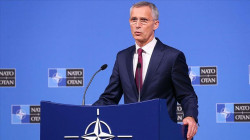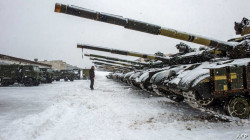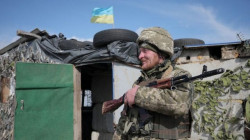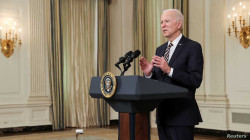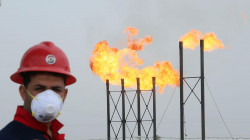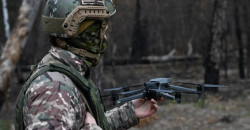Ukraine-Russia conflict: a lingering struggle for power, peace, and global consequences
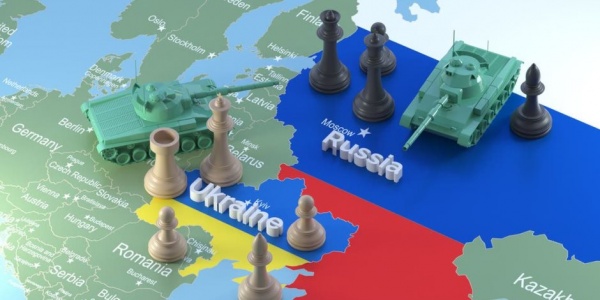
Shafaq News / The ongoing conflict between Russia and Ukraine has entered its second year. Despite the significant human and economic tolls, the escalating political tensions, and shifting frontline conditions, neither party has managed to bring it to a close. The conflict has evolved into a confrontation between Russia and the NATO-aligned western powers, with open military supply lines for the Ukrainian army, exacerbating political tensions and security concerns off the battlefront, indicating a greater flare-up.
The prospect of the conflict morphing into a third-world war is a growing concern, despite the support and arming of the Ukrainian army by NATO.
The conflict's first sparks appeared in the years leading up to February 24, 2022, the day war was declared, with a series of escalating tensions between Moscow and Kyiv. The suspension of the Association Agreement with the EU by Viktor Yanukovych, Ukraine's then-president, after discussions with Russian President Vladimir Putin, was a pivotal moment. Yanukovych subsequently signed an agreement mediated by representatives from the EU and Russia with opposition leaders. Still, after leaving Kyiv for a conference in Kharkiv, his powers were removed by parliament, and the opposition gained control of the government building. This led to the declaration of independence by the regions of Crimea and the republics of Lugansk and Donetsk, sparking armed clashes that continued until the Minsk ceasefire agreements were reached.
Tensions between Moscow and Kyiv escalated due to Russian allegations that the Ukrainian government harshly suppressed pro-independence activists, particularly in the eastern regions, and claims of thousands of deaths among Russian-speaking or Russian-loyalists. Additionally, Moscow accused President Volodymyr Zelensky of supporting "neo-Nazi" organizations since taking office in Kyiv in 2019. The situation was further exacerbated by Kyiv's efforts to ally with the EU and join NATO and the revelation that Ukraine intended to pursue nuclear weapons.
The failure of a meeting between Russia, NATO, the Organization for Security and Cooperation in Europe, and the United States in January 2022 to bridge differences, coupled with reports of Russian military buildup on the border, led to Putin's declaration of a "special operation" in the Donbas region on February 24, 2022. Russian forces quickly took control of the strategic Kherson province in southern Ukraine and subsequently advanced towards the capital, Kyiv, and the important port of Mariupol.
The war has had significant global repercussions, particularly concerning food security, given that Russia and Ukraine are major wheat exporters. Many countries have been negatively impacted, and an agreement was signed in Istanbul in July to allow the export of Ukrainian grain through the Black Sea. Western sanctions against Russia have led to further cuts in the Nord Stream 1 gas pipeline supply to the European Union. There have been concerns about nuclear catastrophe following accusations of the bombing of the Zaporizhzhia nuclear station.
In September, gas leaks were reported at four different locations of the Nord Stream pipeline in the Baltic Sea, and the Ukrainian army launched counterattacks in the south before breaching Russian defenses in the northeast, forcing the Russian army to retreat from the Kharkiv region and lose control of vast areas it had previously held.
According to the "Voice of America" network, a renowned international radio broadcaster, the United States Congress has granted Ukraine over $112 billion in aid, marking the most substantial financial commitment since the U.S. conflict in Iraq two decades ago.
In recent times, numerous Western nations have exhibited indications of arming Ukraine, which includes providing it with Patriot defenses, Leopard, Abrams, and Challenger tanks in recent months. In addition, there are also deliberations regarding the potential supply of F-16 aircraft and long-range missiles.
Since the conflict's inception, Moscow has been subjected to over 11,307 sanctions, rendering Russia the world's most heavily sanctioned country. Moreover, 80% of these sanctions targeted specific individuals, while 18% targeted specific entities, ships, and aircraft.
With 1,948 sanctions, the United States alone imposed the most sanctions on Russia, followed by Switzerland with 1,777, Canada with 1,590, the United Kingdom with 1,414, and the European Union with 1,390.
Additional sanctions against political and military leaders, singers, artists, writers, athletes, media professionals, wealthy individuals, and MPs are currently under discussion among Western powers.
Regarding losses, according to the Russian Ministry of Defense's official figures, 6,000 soldiers were killed, as per the latest statistics issued in September 2022. On the other hand, the latest figures issued in December 2022 indicate that the number of casualties from the Ukrainian side reached 13,000 soldiers. Additionally, the United Nations reported approximately 18,000 civilian casualties and injuries.
Norwegian estimates suggest that the war resulted in nearly 180,000 deaths and injuries in the ranks of the Russian army and 100,000 on the Ukrainian side, in addition to the death of 30,000 civilians.
In a recent speech, Russian President Vladimir Putin declared that his army is presently fighting in Ukraine "for its historical lands," claiming that Russia's defeat is "impossible." Subsequently, the Russian State Duma approved the suspension of the New START Strategic Arms Reduction Treaty signed with the United States, a day after Putin's speech, in which he accused the West of trying to eliminate Russia using the conflict in Ukraine.
In contrast, U.S. President Joe Biden's visit to Kyiv was deemed secretive. However, during his meeting with the leaders of the "Bucharest Group" nations, his speech in Warsaw, Poland, emphasized his country's support for Kyiv remains resolute. Furthermore, Biden reaffirmed that the United States is committed to NATO and the defense of all its member states' territory.
As winter draws to a close, analysts and experts predict an escalation in hostilities on the eastern and southern fronts during spring. The world anticipates a resolution to this conflict, which has been dubbed the "largest" in Europe since World War II, as it enters its second year. Nonetheless, strategists have suggested the prospect of engaging in a protracted attrition battle that could last for years.
